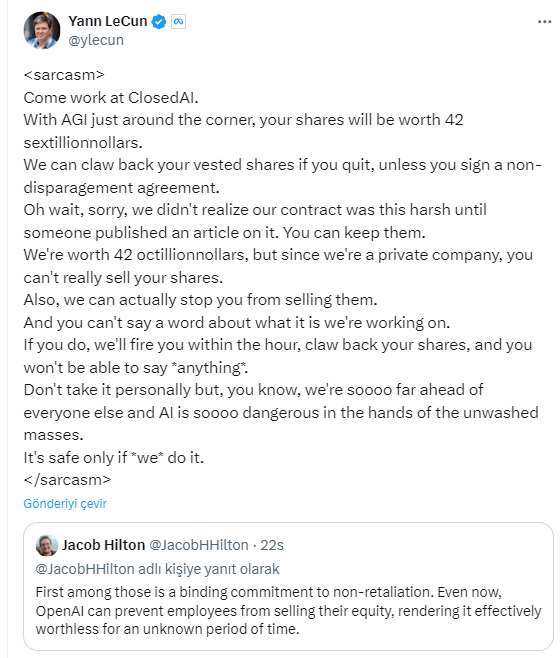Recently, Meta‘s Chief AI Scientist Yann LeCun publicly criticized OpenAI‘s equity policies, sparking a major debate in the artificial intelligence industry. LeCun’s comments, sarcastically valuing OpenAI at an exaggerated “42 sextillion dollars,” highlighted the restrictive and unrealistic nature of the company’s employment contracts. This criticism drew attention to broader issues regarding employee rights and equity management.
LeCun’s Criticisms Resonate at OpenAI
LeCun’s criticisms focused on various problematic aspects of OpenAI‘s policies. These issues included strict non-disclosure and non-disparagement clauses that prevented employees from discussing the company negatively or sharing sensitive information. Additionally, vesting clawback provisions allowed the company to reclaim shares from employees under certain conditions. These measures raised serious concerns about the fairness and transparency of OpenAI’s approach to handling employee equity, particularly the freedom to dispose of shares.

The controversies surrounding OpenAI’s policies came to light following investigative journalism. Public backlash forced OpenAI to reassess its stance, leading to significant policy revisions. OpenAI CEO Sam Altman and other top executives had to directly address these concerns with their employees, acknowledging the problematic nature of previous policies.
OpenAI Responds to Criticisms
In response to the criticisms, OpenAI took steps to make significant changes to its employment contracts. The company removed the contentious non-disclosure and non-disparagement clauses, ensuring that former employees would no longer be restricted by these terms. This move was part of a broader effort to restore trust and demonstrate a commitment to fairness and transparency. OpenAI also reaffirmed its policy allowing former employees to sell their shares at market value, regardless of their current relationship with the company.
Despite these changes, skepticism persists among some former employees and industry observers. Critics argue that while these revisions are necessary, they may not fully address the issues of transparency and equity within OpenAI. Former employee Jacob Hilton, among others, continues to question the company’s commitment to maintaining fair and open practices.

 Türkçe
Türkçe Español
Español









